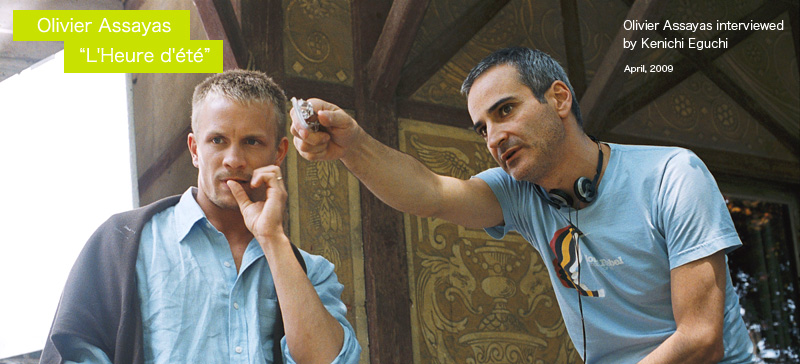Known for his films “Irma Vep”(’96) and “Demonlover”(’02), as well as “Clean”(’04) in which his muse Maggie Chen received the Best Actress Award at the Cannes Film Festival, French film director, Olivier Assayas took on the project for the Musee d’Orsay in Paris (the first project being Le Voyage du Ballon Rouge by Hou Hsiao-hsien). His film “L’heure d’ete (“Summer Hours” ‘08), just released in Japan, appeared as though it might have been a departure from his somewhat more experimental and art house oriented films into a more conventional way of storytelling. Starring Juliette Binoche, Charles Berling and Jérémie Renier as the two brothers and one sister who come together for their mother’s birthday in the familiar house they grew up in. The mother has maintained the artwork and the collection of art nouveau objects and furniture of her beloved artist brother in the house and devotes herself to put together a retrospective and book for him. The oldest brother who is an economist lives in Paris, the second brother who manages the factory for a sporting goods company lives in China and the youngest sister who is a product designer lives in San Francisco. The mother is eager to tell them what is to be done with the artwork when she passes on. The story shows us the transition in family values under the influence of technology and globalization. Here, although in quite conventional appearances, Assayas tells us of the change in society we were are experiencing. As this “L’heure d’ete”, “Noise” and “Clean” will be released in Japan this spring and summer, I thought it would be good time to ask him of what seems to be a step back into the lineage of French filmmaking.
How did you become interested in this idea; to film a family spanning three generations, when the conventional idea of family is deteriorating in this time?
I suppose it has to do with a sense of loss, of time passing, and after the death of my mother, not being able to postpone much longer, dealing with issues that one spends his lifetime avoiding. Yes, the notion of family is deteriorating and it has to do with how modern societies cope with globalization, with major changes in the world's economy, that all tend to cut ourselves off from specific cultures, specific traditions, specific family values.
Your previous films have dealt with contemporary issues while showing us the flip side of things, in language, culture and the human psyche. How does this film fit into that picture?
My films all happen in the same world, the one we all live in, except that I choose to fix my camera at a specific angle, depending on the film. While the characters in “Summer Hours” deal with an environment inherited from the early years of the past century, the characters in “Boarding Gate” are pretty much part of the excesses of radical modernity. But it is all happening simultaneously, and I suppose you can't completely understand one side without grasping the other.
Have you had doubts at first about working with the Orsay museum, that there may be limitations as to what you can and cannot do?
If I had a sense that I wouldn't have complete artistic freedom in making this film for one reason or another, I simply would not have made it.
How was the choice of the house made? And how were the works of art chosen? Did you make the choices matching it to the screenplay, or did it matter to you what works of art were being used?
I wrote a first draft of the screenplay without any objects, and only indications hinting what I was looking for. Then I realized that I had to "cast" the objects before being able to go any further in my writing. So I researched them, focusing on art nouveau decorative art, meaning useful artworks, defined by the relationship between nature, vegetal shapes, art and men. It's of course very much what impressionist painting is all about.
When you say you wanted to go back to the tradition of French films, what films did you have in mind? What films were important in forming vision in filmmaking? Do you feel that you are part of the lineage of French films aside from the fact that you are French? Do you feel that it is in your filmmaking?
I never said I wanted to go back to the tradition of French Filmmaking, I said I wanted to make a French film again after making three films dealing with globabilzed culture and the new narratives it generates. Ultimately, I think I made a film not too far in its subject matter from my other recent movies... I learned most of what filmmaking is about worshipping Robert Bresson. I would not be making movies if not for the Nouvelle Vague and the work of Truffaut, Godard and Rohmer. “Summer Hours” is in its own modest way, an homage to the great Jean Renoir. In that sense, yes, I think of myself as being part of a specific lineage in French cinema.

